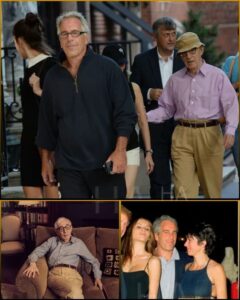Here is an enhanced essay in English, inspired by your prompt, on the theme of masks, power, and the revelations surrounding Woody Allen and Jeffrey Epstein’s Hollywood-inner-circle nexus. You can adapt or trim it as you like.
In the shimmering under-lights of Hollywood, where celebrity smiles are polished and prestige is a currency, the arrival of a figure like Jeffrey Epstein was quietly systematic: he entered, charmed, and embedded himself in the glossy veneer of the entertainment world. Among those invited into that circle—even if unwittingly—was Woody Allen, a filmmaker long-ensconced in the mythos of auteurism. What unfolds is a story of masks pulled from faces the world once adored. The adoration curdles into horror as familiar smiles twist into grimaces beneath the weight of unveiled truths.

From the outside, Epstein’s network appeared benign, even admirable: dinners with Nobel laureates, house parties in Manhattan, films being discussed, ideas exchanged. Woody Allen describes his first dinner at Epstein’s home in December 2010 as unremarkable—he “didn’t know Jeffrey at all then … but we saw all these people there and they all embraced him, so we figured, ‘OK, he’s a substantial character.’” when one looks deeper, the overlay of prestige, art, intellect becomes the stage on which predation, privilege, and protection play out.
The mask in question is the mask of legitimacy. Epstein presented himself as philanthropist, intellectual patron, man of science and culture; he told Allen that he had been “in jail” but suggested it was a miscarriage of justice, and that now he was “giving money to cutting-edge scientists and universities.” That narrative is seductive in circles where the virtue of patronage is worshipped—and where the appearance of good works buys social immunity.
Woody Allen’s recollection is revealing not only for its details but for what it omits and normalizes. “We never, ever, saw Jeffrey with underage girls. He always had a girlfriend but never an under-age girlfriend,” Allen asserted in a recent interview. His refusal to disbelieve the veneer—despite all the widely-reported red flags—speaks to the power of community, of shared status, of closed systems where the very idea of suspicion is deflected by the weight of the crowd.
Yet as time progressed, the masks began to slip. Epstein’s indictment in 2019, his subsequent death in custody, and the cascade of survivors’ testimonies ripped open a social rot hidden beneath the glamour. The famous, the powerful, the adored—many had eaten at his table, charmed by brilliance and philanthropy—were forced into the light. The question is not simply: Did they know? But rather: How did the mask persist so long, and why did so many choose comfort over confrontation?
In this way, Woody Allen—already controversial in his own right—becomes a figure caught between auteur legacy and complicity by proximity. He occupies a vantage point from which to observe, yet his commentary (“He couldn’t have been nicer,” he said of Epstein) seems tone-deaf in the face of survivors’ pain. The horror is not simply that someone like Epstein infiltrated Hollywood’s inner circle. It is that these inner circles allowed him in, and that the mask found willing wearers.
The unraveling of that adoration into horror is a cultural reckoning. The familiar faces we trusted—actors, producers, financiers, philanthropists—must now be re-viewed through a lens of accountability. The social clubs, the dinner tables, the “illustrious people” that Allen described become sites of inquiry rather than simply anecdotes of glamour.
In the end, what Woody Allen’s story with Epstein reminds us is this: when power, prestige, and proximity converge, the mask works best when no one looks. And once someone begins to look, the mask cracks. The faces the world once adored lose their smooth outlines. The smile begins to resemble a grimace. And the veneer—once brilliant under the lights—crumbles into shame.
Leave a Reply